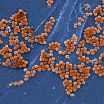(Press-News.org) Increases in excess fat adversely affect multiple cardiometabolic risk markers even in lean young adults according to a new study published this week in PLOS Medicine. The study by Peter Würtz from the University of Oulu, Finland, and colleagues suggests that, even within the range of body-mass index (BMI) considered to be healthy, there is no threshold below which a BMI increase does not adversely affect the metabolic profile of an individual.
Adiposity, or having excess body fat, is a growing global threat to public health. Compared to people with a lean body weight, individuals with higher BMI have an elevated risk of developing life-shortening cardiometabolic diseases, such as diabetes, heart attack, and stroke. In their study Dr. Würtz and colleagues used a technique called Mendelian randomization to assess whether increases in BMI in 12,664 mostly non-obese adolescents and young adults causally affects multiple cardiometabolic risk markers (82 molecules measured in their blood at a single time point). The authors found that adiposity adversely influences not only cholesterol and blood sugar levels, but also causes many other metabolic abnormalities across different metabolic pathways.
In a further analysis in which the authors studied the change in BMI and cardiometabolic risk markers of 1,488 young adults over 6 years, the authors found that the cardiometabolic risk profile of an individual was highly responsive to weight change over time.
The authors conclude, "[t]he ideal body weight that healthy adults should strive to attain remains controversial... The present study suggests widespread adverse metabolic effects with any increase in BMI among young adults within the non-obese weight range. However, modest weight loss was accompanied by multiple favorable changes in the systemic metabolite profile. The causative effect of adiposity on multiple cardiometabolic risk markers across the metabolite profile highlights the importance of population-level weight reduction as a key target for comprehensive risk factor control among young adults."
INFORMATION:
Research Article
Funding: This study was supported by the Academy of Finland (grant no. 137870, 139635, 250422,136895,263836, 134309, 117797, 41071, 266286, 104781, 120315, 129418), and the Responding to Public Health Challenges Research Programme of the Academy of Finland (129269, 129429, 126925, 121584, 124282, 129378), and the Center of Excellence in Complex Disease Genetics, the Sigrid Juselius Foundation, the Yrjo¨ Jahnsson Foundation, the Finnish Foundation for Cardiovascular Research, the Finnish Diabetes Research Foundation; Oulu, Helsinki, Kuopio, Tampere, and Turku University Central Hospital Medical Funds, Biocenter Oulu, the Novo Nordisk Foundation, the Emil Aaltonen Foundation, the Paavo Nurmi Foundation, the Jenny and Antti Wihuri Foundation, the Juho
Vainio Foundation, the Finnish Cultural Foundation, the Finnish Funding Agency for Technology and Innovation, Strategic Research Funding from the University of Oulu, the Social Insurance Institution of Finland, the UK National Institute of Health Research (NIHR) Biomedical Research Centre at Imperial College Health Care NHS Trust and Imperial College London, the Medical Research Council UK, the US National Heart, Lung, and Blood Institute (5R01HL087679), the US National Institute of Mental Health (1RL1MH083268), the European Network of Genomic and Genetic Epidemiology project, and the European Union Seventh Framework Programme (BiomarCaRE: HEALTH-F2-2011-278913 and EurHEALTHAgeing: 277849). The funders had no role in study design, data collection and analysis, decision to publish, or preparation of the manuscript.
Competing Interests: PW, AJK, PS, and MAK are shareholders of Brainshake Ltd, a startup company offering NMR-based metabolite profiling. SB has received research funding from Abbott, Abbott Diagnostics, Bayer, Boehringer Ingelheim, SIEMENS, and Thermo Fisher. SB has received honoraria for lectures from Abbott, Abbott Diagnostics, Astra Zeneca, Bayer, Boehringer Ingelheim, Medtronic, Pfizer, Roche, SIEMENS Diagnostics, SIEMENS, Thermo Fisher, and as member of Advisory Boards and for consulting for Boehringer Ingelheim, Bayer, Novartis, Roche, and Thermo Fisher. GDS is a member of the Editorial Board of PLOS Medicine. All other authors declare that no competing interests exist.
Citation: Würtz P, Wang Q, Kangas AJ, Richmond RC, Skarp J, et al. (2014) Metabolic Signatures of Adiposity in Young Adults: Mendelian Randomization Analysis and Effects of Weight Change. PLoS Med 11(12): e1001765. doi:10.1371/journal.pmed.1001765
Author Affiliations:
University of Oulu, FINLAND
University of Helsinki, FINLAND
University of Eastern Finland, FINLAND
University of Bristol, UNITED KINGDOM
National Institute for Health and Welfare, FINLAND
University of Turku and Turku University Hospital, FINLAND
University of Tampere and Tampere University Hospital, FINLAND
University Heart Center Hamburg, GERMANY
Finnish Institute of Occupational Health, FINLAND
Central Finland Central Hospital, FINLAND
Imperial College London, UNITED KINGDOM
Helsinki University Central Hospital, FINLAND
Wellcome Trust Sanger Institute, UNITED KINGDOM
Contact:
Peter Würtz
University of Oulu
FINLAND
+358 504670900
peter.wurtz@computationalmedicine.fi
http://www.computationalmedicine.fi
December 9, 2014 -- Methicillin-resistant Staphylococcus aureus (MRSA) is a common cause of hospital-acquired infections, with the largest burden of infections occurring in under-resourced hospitals. While genome sequencing has previously been applied in well-resourced clinical settings to track the spread of MRSA, transmission dynamics in settings with more limited infection control is unknown. In a study published online today in Genome Research, researchers used genome sequencing to understand the spread of MRSA in a resource-limited hospital with high transmission rates.
Patients ...
SAN FRANCISCO (DECEMBER 9, 2014) -Common variations in four genes related to brain inflammation or cells' response to damage from oxidation may contribute to the problems with memory, learning and other cognitive functions seen in children treated for acute lymphoblastic leukemia (ALL), according to a study led by researchers from Boston Children's Hospital, The Children's Hospital at Montefiore, and Dana-Farber/Boston Children's Cancer and Blood Disorders Center.
The data, presented at the 56th annual meeting of the American Society of Hematology (abstract #856), suggest ...
A team of Massachusetts General Hospital (MGH) investigators has identified what may be a biomarker predicting the development of the dangerous systemic infection sepsis in patients with serious burns. In their report in the open-access journal PLOS ONE, the researchers describe finding that the motion through a microfluidic device of the white blood cells called neutrophils is significantly altered two to three days before sepsis develops, a finding that may provide a critically needed method for early diagnosis.
"Neutrophils are the major white blood cell protecting ...
Timing is key for brain cells controlling a complex motor activity like the singing of a bird, finds a new study published by PLOS Biology.
"You can learn much more about what a bird is singing by looking at the timing of neurons firing in its brain than by looking at the rate that they fire," says Sam Sober, a biologist at Emory University whose lab led the study. "Just a millisecond difference in the timing of a neuron's activity makes a difference in the sound that comes out of the bird's beak."
The findings are the first to suggest that fine-scale timing of neurons ...
Researchers from the University of Cambridge have used genome sequencing to monitor how the spread of methicillin-resistant Staphylococcus aureus (MRSA) occurs in under-resourced hospitals. By pinpointing how and when MRSA was transmitted over a three-month period at a hospital in northeast Thailand, the researchers are hoping their results will support evidence-based policies around infection control.
MRSA is a common cause of hospital-acquired infections, with the largest burden of infections occurring in under-resourced hospitals in the developing world. Whereas genome ...
The availability of a trace nutrient can cause genome-wide changes to how organisms encode proteins, report scientists from the University of Chicago in PLoS Biology on Dec. 9. The use of the nutrient - which is produced by bacteria and absorbed in the gut - appears to boost the speed and accuracy of protein production in specific ways.
"This is in some sense a 'you are what you eat' hypothesis,"' said senior study author D. Allan Drummond, PhD, assistant professor of biochemistry and molecular biology at the University of Chicago. "This nutrient that is absorbed through ...
AUDIO:
Nitrous oxide, often called laughing gas, has been used in medicine and in dentistry for more than 150 years. But researchers at Washington University School of Medicine in St. Louis...
Click here for more information.
Nitrous oxide, or laughing gas, has shown early promise as a potential treatment for severe depression in patients whose symptoms don't respond to standard therapies. The pilot study, at Washington University School of Medicine in St. Louis, is believed to ...
A new policy paper by a University of York academic calls for limits on the influence of the drinks industry in shaping alcohol policy because it has a 'fundamental conflict of interest'.
The article by Professor Jim McCambridge, of the Department of Health Sciences at York and academics at King's College London and the University of Newcastle, New South Wales, is published in this week's PLOS Medicine.
It says the concept of harm reduction has been co-opted by industry interests in public health debates about reducing the damage caused by alcohol. The paper argues ...
Is being located next to a big-name competitor always bad for your small business? A new study in the Journal of Marketing Research shows that contrary to accepted belief, the presence of a large, nearby competitor can actually boost the sales of smaller brands.
"When the owner of Los Angeles's Coffee Bean & Tea Leaf could not stop Starbucks from moving in next door, he at first admitted defeat," note authors Neeru Paharia (Georgetown University), Jill Avery (Harvard University), and Anat Keinan (Harvard University). "However, soon after, he was surprised to see his sales ...
LOS ANGELES (Dec. 09, 2014) - A computer system was more effective than doctors at collecting information about patient symptoms, producing reports that were more complete, organized and useful than narratives generated by physicians during office visits, according to a Cedars-Sinai study.
Investigators said the research, published in the American Journal of Gastroenterology, highlights the potential of computers to enhance the quality of medical care and improve outcomes by harnessing accurate and thorough patient information.
The authors said they did not expect ...



